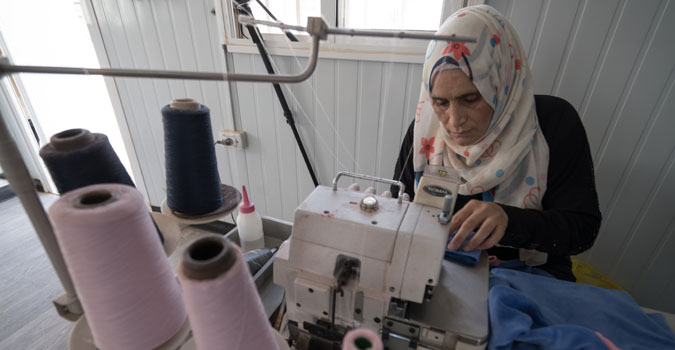A desert Oasis

When Fatima first arrived in Za’atari Camp, she felt that she was carrying a sadness that she could not escape. Even spending time with her friends couldn’t bring relief. They would reminisce about life in Syria, but these memories only filled her heart with grief. It was affecting every aspect of her life, even the time she spent with her children.
But today, Fatima isn’t dwelling on the past. Rather, she shares her story to help illustrate the difference between where she was two years ago, and where she is now.
Standing behind a large cutting table in one of the three tailoring caravans located in the Women and Girls Oasis in Za’atari Camp, Fatima holds up a tiny blue sweater adorned with a bright red collar. It is one of the 21 pieces of clothing included in the “baby kits” that the women produce in the workshop and which are then distributed to women who give birth in the camp; and it’s her favourite. In addition to clothing, the kits include other essentials like warm blankets, and even an insulated baby basinet. To date, they have produced over such 4000 baby kits.
“I visit the women in the hospital and I see the happiness on their faces. Seeing that, it makes me happy,” says Fatima. “We are meeting a very real need for these women.”
Across the Oasis in another caravan, this one fitted out as a hairdressing salon, a young woman also named Fatima is diligently applying henna to a repeat customer, Isra. The women are friends from Syria, and Isra can’t help but praise her friend’s talents: “She was the best in Syria, now, she’s the best in Za’atari!”
The tailoring workshop and the salon are but two of the many cash-for-work projects that the Oasis operates in the camp – which is also Za’atari’s largest female-focused such programme - alongside other initiatives that aim to empower Syrian women refugees through increased access to economic opportunities and meaningful engagement in community life.
Other offerings of the Oasis include language classes, information and protection referrals on key issues such as registration, hygiene, health, and sexual and gender-based violence. There is also a day care centre in each Oasis to allow women working at the Oasis to stay with their kids throughout the day, and to provide after school support to children enrolled in education.
Back in the tailoring workshop, Fatima is explaining how her life has changed since getting involved with the Oasis: “I am so busy now, I see my children less,” she says “but the time I spend with them is of better quality, because I am no longer burdened by the sadness.”